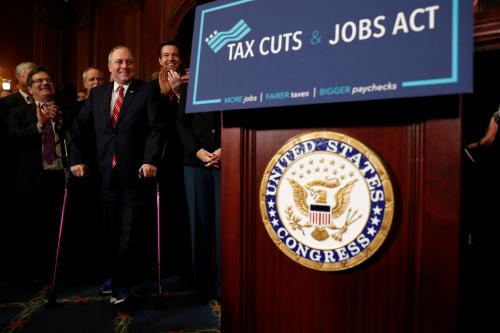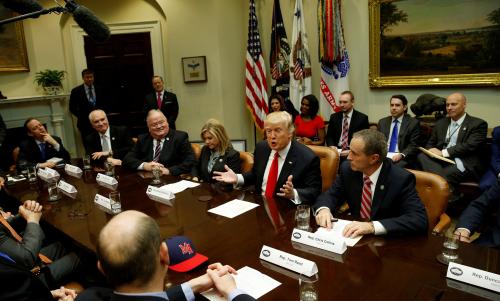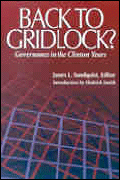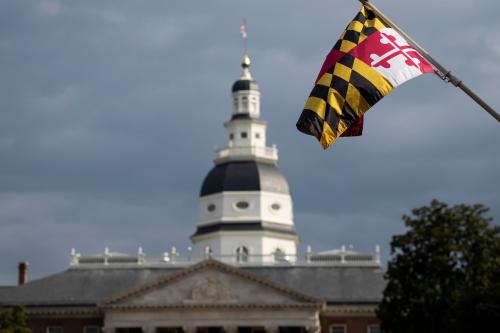As Labor Day approaches, congressional campaigns around the country are preparing for the home stretch before November’s midterm elections. But as my Brookings colleague Vanessa Williamson argues in a new paper, Republicans’ signature legislative achievement of the 115th Congress—the Tax Cuts and Jobs Act (TCJA)—may not matter for the outcome of those elections as much as many suspect.
Williamson outlines a series of reasons—all of which draw on lessons from the political science literature—for why we should be skeptical that the TCJA will have major consequences for the 2018 election. Central to this analysis are two especially important arguments about how voters make decisions, both at the ballot box and in terms of their assessment of policy issues. Economic conditions matter, she argues, with voters tending to reward incumbent parties when the economy is doing well. But people tend to respond to the overall state of the economy, not their personal economic situation. To the extent that the TCJA increases individuals’ take-home pay—which it does by only a small amount for most Americans—it’s unlikely to change how those voters behave. In addition, economic conditions appear to matter less for midterm congressional elections than for presidential ones. Voters’ assessments of the tax bill, moreover, may be as much the product of their partisan affiliation as a cause of their support for the party; put differently, when Republicans express support for the tax bill, they are likely doing so because it was a key priority of the party with which they identify.
Another possible consequence of the TCJA of which Williamson is skeptical is its value as a way to mobilize Republican voters. While the legislation remains popular among Republicans, support for it has not increased in recent months and appears somewhat sensitive to partisan cues—that is, reminders in survey questions that the policy was a GOP initiative. As Williamson points out, several Republican campaigns, including those in special elections in Pennsylvania and Ohio, largely abandoned TCJA-related messaging. An analysis from the Cook Political Report of ads run between January and July 2018 for House and Senate seats also suggests that Republicans may not see an overwhelming focus on the tax bill as the optimal electoral strategy. Taxes and pro-Trump ads both made up approximately 18 percent of GOP ads, with immigration following closely behind at 15 percent. Republicans have been running on the tax bill, but not to the exclusion of other issues.
Importantly, Williamson doesn’t argue that that the policy choices made by members of Congress never have electoral consequences. There’s evidence from several studies, for example, that the votes Democratic members of Congress cast on the Affordable Care Act in 2009 and 2010 had consequences for them at the ballot box. But, as Williamson notes, that same research suggests that the ACA is somewhat unusual in the effect it had on the 2010 election. In addition, Democrats, she points out, aren’t likely to exert as much effort running against the tax bill as Republicans did for the ACA. Indeed, the same Cook Political Report analysis that suggests Republicans haven’t been campaigning exclusively on the tax bill indicates that Democrats have had a much clearer message. Roughly 31 percent of ads in Democratic campaigns between January and July were about health care—a rate more than double the next most frequent issue (anti-Trump messages, which comprised roughly 14 percent of ads).
Williamson’s analysis concludes with a discussion of an oft-repeated refrain from congressional Republicans during the development and passage of the TJCA: that if they did not pass the bill, “financial contributions will stop” and that “donors [were] basically saying, ‘Get it done or don’t ever call me again.’” These claims—as Williamson notes—are impossible to prove; we’ll never know if a Republican majority that didn’t pass tax cuts would have actually been cut off by high dollar donors. But it is much clearer that members believed this to be true, reminding us that when it comes to policymaking in Congress, the perceptions legislators have of how the world works can be as important an explanation for members’ behavior as anything else.
The Brookings Institution is committed to quality, independence, and impact.
We are supported by a diverse array of funders. In line with our values and policies, each Brookings publication represents the sole views of its author(s).











Commentary
Republicans cut taxes last year—will voters care in November?
August 28, 2018